Paphos Travel Guide
Situated on the southwest coast of Cyprus, Paphos was the capital of the island in Roman times. Legend has it that the city is built on the spot where the Greek Goddess of love, Aphrodite, was born.
The city also has many connections to and relics from early Christianity. Over the centuries, it has survived numerous foreign incursions and raids, and even a devastating earthquake in the 4th century. It lost out to Larnaca as a major port in the Middle Ages and experienced a decline during the British colonial period, when development of this part of the island came to a standstill.
Today, Paphos is a popular seaside resort with a large population. The Ktima section of the city is the main residential area, while Kato Paphos is the playground of holidaymakers, built around the medieval port with its numerous luxury hotels, tavernas, and entertainment venues.
Most visitors to Paphos stay in one of the many hotels that dot the sandy coastline. The beach around the Rock of Aphrodite offers some of the best snorkelling in Cyprus, while Pissouri Beach and Kourion Beach are popular with water skiers and windsurfers. Paphos Municipal Beach is conveniently located close to the centre of town, and has a long promenade with plenty of restaurants and bars nearby. Paphos also makes a great base for exploring the unspoilt beauty of the Akamas Peninsula, the Diarizos River Valley, and the Ezouza Valley.
Things to do in Paphos
Paphos is one of the most popular sightseeing destinations in Cyprus and it continues to attract more and more tourists who enjoy its beautiful setting and archaeological treasures. Visitors will find a lot to see and do if they can tear themselves away from the stunning beaches.
Near the Paphos Lighthouse, the Cypriot Acropolis offers numerous archaeological attractions, including the restored Roman Odeon and the remains of a Roman temple. Possibly the greatest attraction of Paphos is the collection of ancient mosaics found at sites around the city. People can see some examples of these ancient works of art at the acropolis. It's definitely also worth making time to visit the Roman noblemen's villas, where the best examples of mosaics can be admired.
Two special monasteries close to Paphos are popular as quick excursions out of the city or as a stopover when seeking out one of the gorgeous beaches in the area. The Ayios Neophytos Monastery is a great spot to enjoy some peace and tranquillity away from the bustle of the city, and the Chrysorrogiatissa Monastery has the added attraction of producing its own wine, made onsite by the monks.
Paphos is surrounded by lovely landscapes and attractions such as the Rock of Aphrodite, a great spot to enjoy a beautiful swim. There are also a number of attractions in Paphos that capitalise on the mythical significance of the area, such as the famous Baths of Aphrodite.
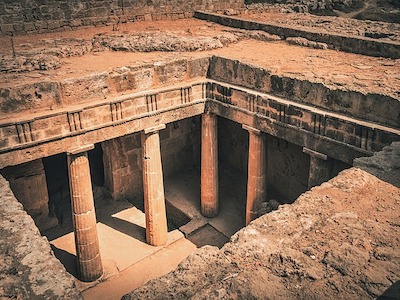
Tombs of the Kings
There is no royalty buried in the Tombs of the Kings, a grand mausoleum found one mile (2km) northwest of Paphos Harbour towards Coral Bay. Rather, it's the final resting place of about 100 Ptolemaic aristocrats who lived and died in the city between 3 BC and 3 AD. The tombs are carved into the solid rock of the cliff above the sea and are beautifully situated, with some featuring Doric pillars and frescoed walls. Archaeological excavations are ongoing at the site, which also features a church known as Paleoekklisia, sporting traces of Byzantine frescoes. The Tombs of the Kings usually feature very high in tourist reviews of Paphos and are thrilling to discover.
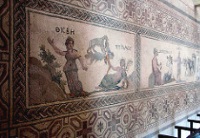
The Mosaics of Paphos
The Mosaics of Paphos are a series of striking floors in a number of ancient Roman villas, dating from the 3rd to the 5th centuries. The sites are still being excavated on around 300 metres from the Paphos Harbour. The mosaics featuring mythological scenes are visible in the Houses of Dionysos, Orpheus, Aion, and the Theseus. There are also stunning mosaics to be seen in the House of Four Seasons. All the mosaics were made from small cubes of marble and stone, called tesserae, with glass paste added to widen the range of colour.

Agia Solomoni Catacombs
A large pistachio tree marks the entrance to the underground catacombs of Agia Solomoni in Kato Paphos. A strange sight, it's usually festooned with cloth tied onto it by the faithful as offerings in the hope the sacred tree will cure various ailments. The catacombs were carved into Fabrica Hill in the 4th century BC, below the ancient Roman wall. Underground chapels feature frescoes and graffiti left by 13th century crusaders, and there are numerous legends and stories attached to the patron saint Ayia Solomoni. There's little to no guidance or information on offer at the site, so it's best that visitors do some research before going to understand what they're looking at.
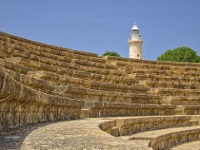
Acropolis
Located near the modern Paphos Lighthouse, the Cypriot Acropolis is a complex of ancient buildings that includes a 2nd century Roman odeon restored and now used for summer orchestral and stage performances. South of the odeon are the remnants of the Roman Temple of Asclepius, the god of medicine, and north of the lighthouse are the ruins of the ancient town walls. One of Cyprus's world-renowned ancient treasures is the stunning set of mosaics of the acropolis near the harbour. These incredibly well-preserved artworks often top the list of Cyprus attractions and have been delighting visitors for decades.
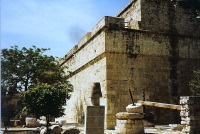
Cyprus Medieval Museum
Built in the 14th century, Limassol Castle stands guard over the old harbour on the site of an earlier Byzantine castle. Today it houses the Cyprus Medieval Museum with a host of fascinating exhibits dating back to the Early Common Era (384-650). The museum's collection boasts an array of weaponry and armour, including swords, helmets, and the 500 year old canons that still adorn the battlements. The castle is most renowned for being the place where crusader King Richard the Lionheart married Berengaria of Navarre and crowned her Queen of England in 1191.
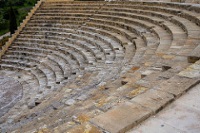
Kourion
Believed to have been founded by the Argives, the ancient city of Kourion is one of the most beautifully positioned ancient sites in Cyprus. It has passed through different phases, including the Hellenistic, Christian, and Roman periods, the agora (market place), Christian Basilica, and large public bath bearing testament to this city's impressive list of inhabitants. The restored Greco-Roman theatre hosts open air performances and is one of the venues for the International Festival of Ancient Greek Drama. Attractions around the complex include the House of the Gladiators, the Roman baths, the House of Achilles, and the Temple of Apollo.
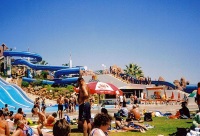
Fasouri Water Mania
Visitors to Limassol who are in need a break from sightseeing and the Cyprus heat should splash in the cool waters and enjoy the fun slides at Water Mania. The water park is suitable for travellers of all ages and is a great attraction for the whole family. If visitors are travelling in Cyprus with kids, then this is the ideal way to let them blow off some steam. The park has a somewhat cheesy Polynesian theme but it provides good wholesome fun and a safe environment.
Getting Around
Paphos has a reliable and inexpensive bus system connecting Kato Paphos and the upper town. Hiring a car is a good way to explore the surrounding areas but the main parts of town can be easily navigated on foot.
Municipal taxis are available and tend to be reasonably priced, servicing Paphos and its surrounds. However, it's recommended that these are hailed rather than pre-booked, as drivers tend to turn on meters when leaving to pick up passengers. If taxis are unmetered, travellers should be sure to agree on a fare before setting out for their destination.
For the more adventurous, hiring a scooter can be an exciting way to explore Paphos but accident rates are very high. If visitors are brave enough to enjoy this mode of transport, investing in a helmet is highly advised. In general, Paphos is not a difficult or expensive city to get around.
Paphos Climate and Weather
Paphos has a semi-arid Mediterranean climate and doesn't receive much rainfall throughout the year. Summers are warm, muggy, dry and clear, and the average temperature is around 32C (87F). Winter months are cool, windy, and mostly clear, with an average temperature of 17C (67F). Paphos is at its best between June and September, when visitors can expect plenty of hot sunshine, cloudless blue skies and an average sea temperature of 27C (81F).
Cyprus travel info
Electricity
Electrical current is 240 volts, 50Hz. UK-style three square-pin plugs are used.
Language
The majority of Cypriots speak Greek, and a small percentage speaks Turkish. The Greek Cypriot dialect differs from mainland Greece. English, German and French are spoken in tourist areas.
Money
The official currency is the euro (EUR). Money can be exchanged at banks, which are open from Monday to Friday. ATMs that operate 24 hours a day are spread throughout the island; major credit cards are accepted in most establishments.
Tipping
A 10 percent service charge is levied in hotels and restaurants so a tip is not obligatory, but small change is always welcome. Taxi drivers and porters appreciate a small tip.
Health
All eligible travellers should be up to date with their COVID-19 vaccines, and hepatitis A and B vaccinations are always recommended for travellers by health authorities. After Brexit, the Global Health Insurance Card (GHIC) replaced the European Health Insurance Card (EHIC) for UK citizens. The GHIC allows UK citizens access to state healthcare during visits to the EU. The GHIC is not valid in Norway, Iceland, Liechtenstein or Switzerland, nor is it an alternative to travel insurance. Medical fees are reasonable in Cyprus, but supplies are expensive and it is probably a good idea for visitors to bring any important prescription medications they may require (with the appropriate notes from their doctor to get them through customs).
Safety
Crime against tourists is rare and the area is generally safe.
Local customs
Visitors should avoid taking photographs near military establishments. Religious customs such as Ramadan should be respected, particularly in the north where most of the Turkish Cypriots are Muslim; travellers should avoid eating, drinking, smoking and chewing gum in public during the holy month. Women should dress modestly.
Doing business
Business in Cyprus is best conducted face-to-face, as developing a working relationship based on trust is important. Business is conducted formally, and dress should be smart and conservative (a suit and tie are the norm). Greetings are usually made with a handshake, and business cards are exchanged. It is common for women to hold high positions and they are generally well respected in the business world. Punctuality is important, but meetings may not begin on time. Business hours can vary according to the season, but are usually 8am to 1pm and 4pm to 7pm Monday to Friday in summer, closing at 5pm in winter.
Duty free
Travellers to Cyprus over 17 years arriving from non-EU countries do not have to pay duty on 200 cigarettes or 100 cigarillos or 50 cigars or 250g smoking tobacco; 1 litre spirits with higher than 22 percent alcohol volume or 2 litres spirits or aperitifs with less than 22 percent alcohol volume, or 2 litres of fortified or sparkling wine, 4 litres of still wine, or 16 litres of beer.
Communications
The international access code for Cyprus is +357. The outgoing code is 00 followed by the relevant country code (e.g. 0044 for the United Kingdom). Visitors can purchase local SIM cards for their phones and WiFi is increasingly available in many cafes, restaurants and airports, and at most hotels, especially in the south (the Republic).
Passport & Visa
Travellers, except EEA nationals, should hold an onward or return ticket and documentation necessary for that journey, as well as sufficient funds for the period of intended stay in Cyprus. It is also advisable to have a hotel reservation. Extensions are available to visa-exempt nationals. Travellers should note that foreigners entering Cyprus north of the UN-patrolled 'green line' are deemed by the Government of the Republic of Cyprus to have entered illegally, and can be fined when crossing to the south (EU). Policies and procedures are subject to sudden changes, and visitors should check on the current situation before departing for Cyprus. It is highly recommended that visitors' passports have at least six months' validity remaining after the intended date of departure from their travel destination. Immigration officials often apply different rules to those stated by travel agents and official sources.
Entry requirements
US nationals must have a passport valid for six months beyond the period of intended stay in Cyprus. A visa is not required for a stay of up to 90 days.
British passports must be valid three months beyond period of intended stay. No visa is required for a touristic stay of up to 90 days.
Canadian nationals must have a passport valid for six months beyond the period of intended stay. No visa is required for stays of up to 90 days.
Australian nationals must have a passport valid for six months beyond the period of intended stay. No visa is required for stays of up to 90 days.
South African nationals must have a passport valid for at least three months beyond the period of intended stay. A visa is required, except for those carrying multiple-entry Schengen C visas that have already entered the Schengen area or been issued by Bulgaria, Croatia, Romania or a Schengen Member State. This exemption lasts for 90 days.
Irish nationals must hold a passport valid upon arrival. No visa is required.
New Zealand nationals must have a passport valid for three months beyond the period of intended stay. No visa is required for stays of up to 90 days.
Useful contacts
Cyprus Tourist Organisation, Nicosia: +357 22691100 or www.visitcyprus.org.cy
112 (General Emergency Helpline)


